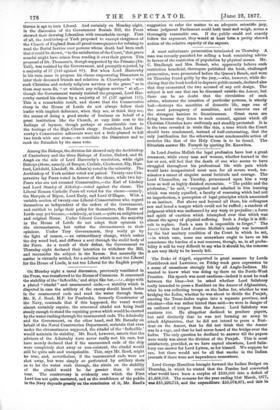Among the Bishops, the division list showed only the Archbishop
of Canterbury and the three Bishops of Exeter, Oxford, and St. Asaph on the aide of Lord Harrowby's resolution, while eight Bishops (those, namely, of Bangor, Carlisle, Chichester, Ely, Here- ford, Lichfield, Llandaff, St. Alban's) voted in the minority. The Archbishop of York neither voted nor paired. Twenty-one Con- servative lay Peers voted in favour of the clause, while two lay- Peers who are not counted Conservative,—the Earl of Lindsey and Lord Stanley of Alderley—voted against the clause. The Liberal Roman Catholic Peers all voted for the clause—namely, the Marquis of Ripon, Lord Emly, and Lord O'Hagan. With a variable section of twenty-one Liberal-Conservatives who regard themselves as independent of the orders of the Government, and entitled to judge their policy for themselves, the House of Lords may yet become,—relatively, at least,—quite an enlightened and original House. Under Liberal Governments, the majority in the House of Lords do not adapt their opinions to the circumstances, but rather the circumstances to their opinions. Under Tory Governments, they really go by the light of reason, — an extraordinary change, which makes the dry wood bud, and diffuses a soul through the stolid body of the Peers. As a result of their defeat, the Government on Thursday night declared their intention to withdraw the Bill, and reconsider the subject in the Recess. But assuredly the matter is virtually settled, for a solution which is not too Liberal for the House of Lords, is not too Liberal for the English people.


































 Previous page
Previous page